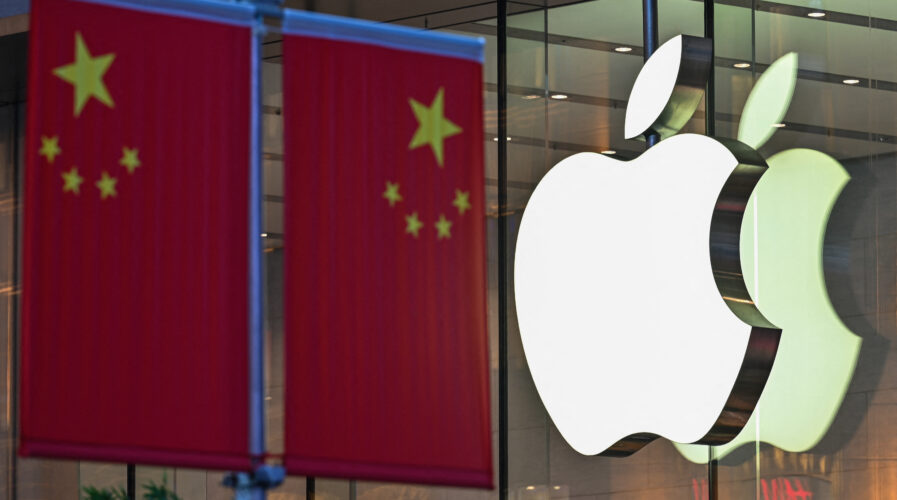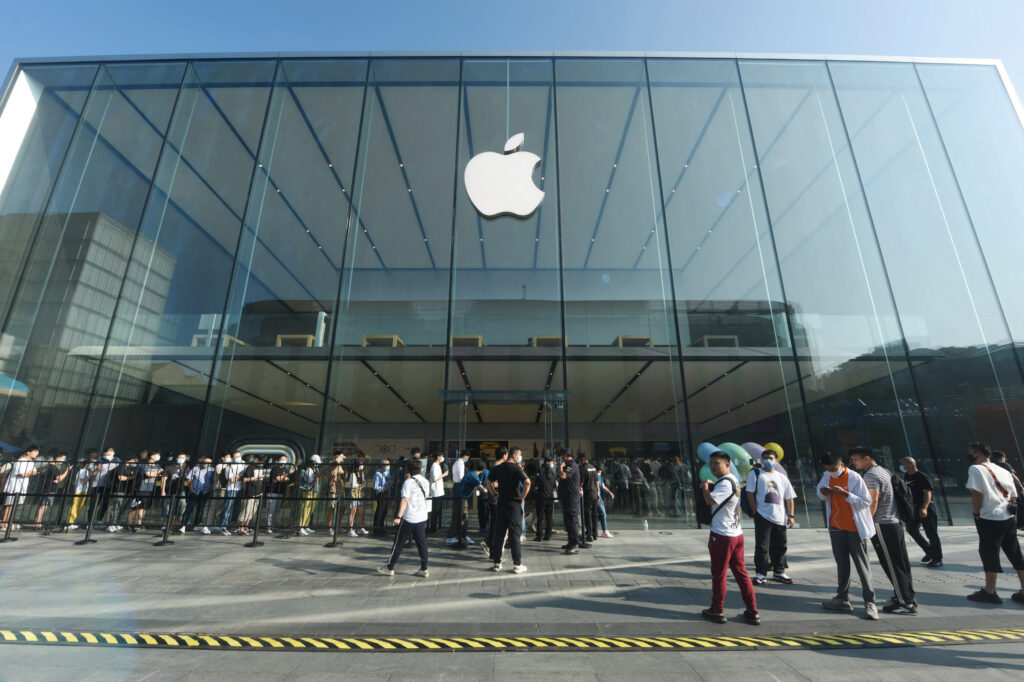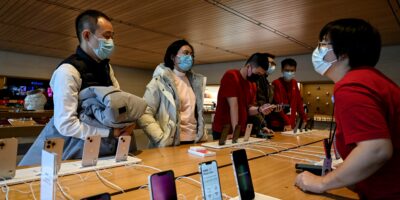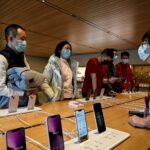
The Chinese national flag is displayed in front of an Apple store in Shanghai. (Photo by Hector RETAMAL / AFP)
Apple limiting Airdrop file-sharing in China – kowtow or privacy champion?
By Joe Devanesan | 17 November, 2022
A month after it emerged that protesters in China were using the AirDrop function on iPhones to digitally share anti-government flyers with strangers without their consent, Apple began limiting file-sharing for Chinese iPhone users last week.
In what is apparently the latest in a string of incidents, Apple appears to be conceding to Chinese demands to block the spread of content deemed inflammatory to the government — but can it also be construed as Apple doubling down on its privacy and security pledges, and preventing misuse of its Airdrop universal share option to all Apple devices within a certain range?
Under the update to the AirDrop function last week, users of smartphones sold by Apple in China can only opt in to receive files from non-contacts during a 10-minute window, before it automatically shuts off. The feature did not previously have a time limit in China, or anywhere else.
The update was rolled out in the iOS operating system practically overnight, and makes it next-to-impossible to receive unrequested files from strangers. The change follows widespread reports of people using AirDrop to spread leaflets critical of the Chinese Communist Party in crowded public spaces — a digital version of a protest that was partly inspired by an incident in Beijing in which a man hung banners calling for the removal of President Xi Jinping.
As per their usual practice, Chinese censors quickly scrubbed online videos and posts appearing on the mainland that made reference to the protest, while hundreds of users on the popular payment and chat app WeChat had their accounts blocked after speaking about the rare act of rebellion. Apple declined AFP‘s request for comment on the record but the company is now understood to be planning a roll out of the Airdrop feature update across the globe.
Apple phones sold outside mainland China did not appear to be affected by the update last week, while iPhones sold in China displayed the limit regardless of which country the user’s App Store account was based in. The description for users said the update “includes bug fixes and security updates”.

Customers queue to get newly-launched iPhone 14 mobile phones at an Apple store in Hangzhou, in China’s eastern Zhejiang province. (Photo by AFP) / China OUT
Airdrop update highlights the cost of doing business in China
The world’s most valuable company based out of Cupertino, California, touts security and privacy protections as key features of its device ecosystem, but has previously faced criticism for alleged concessions to Beijing.
Following widescale Western sanctions and a stifling zero-Covid policy that have derailed its international technological cooperation and thrown manufacturing supply chains into disarray, including for locally made iPhones, China is seen by observers as becoming increasingly repressive as President Xi Jinping embarks on his third term as the country’s most powerful figure.
“This is one small sample of a type of China cost…that’s making China much less appealing as a investment and manufacturing destination for many global multinationals many global companies,” Isaac Stone Fish, CEO of Strategy Risks, told AFP. “Apple has to understand the very real risks of being overly exposed to China in 2022.”
Other apparent concessions included opening a data center in China, as well as removing an app in 2019 that allowed Hong Kong pro-democracy protesters to keep track of police. It has also faced boycott threats in China as it stands in the crossfire of US-China tensions, with Beijing warning in 2020 that it could turn its citizens against Apple if Washington blocked Chinese apps.
Some Chinese social media users last week hailed the iPhone update as a positive step in preventing unsolicited messages from strangers. One Weibo user said the change would “greatly reduce the probability of iPhone users being harassed”.
A handful questioned why the function was only being rolled out on Chinese iPhones, with one Weibo commenter joking about Apple CEO Tim Cook’s friendliness with Beijing: “So is Tim Cook a Party member or not?”
With reporting by Jing Xuan TENG © Agence France-Presse
Joe Devanesan
| ![]() @thecrystalcrown
@thecrystalcrown
Joe's interest in tech began when, as a child, he first saw footage of the Apollo space missions. He still holds out hope to either see the first man on Mars, or Jetson’s-style flying cars in his lifetime.
READ MORE
- Strategies for Democratizing GenAI
- The criticality of endpoint management in cybersecurity and operations
- Ethical AI: The renewed importance of safeguarding data and customer privacy in Generative AI applications
- How Japan balances AI-driven opportunities with cybersecurity needs
- Deploying SASE: Benchmarking your approach


